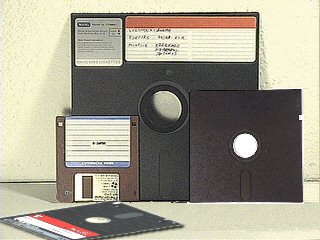
Back in the late 1970s I remember having a huge 8 inch floppy disk drive - much faster than the cassette tapes I was using then for storing my computer programs. I believe they could store 40K of information. They didn't last and we migrated to storage on 5¼ floppies which stored 100Kb and could be inserted no less than 8 different ways in the drive of which just two worked! We had great fun with them and regularly had pleas for help because 'My floppy won't work'. Getting there I found disks stapled, paper clipped, folded to go in a pocket, the wrong way round, covered in fingerprints and disks corrupted by being kept on top of speakers, fastened to the fridge with a magnet and stored under phones which wiped them when the bell rang.
I remember buying my first hard drive - 10MB (I thought I'd never fill a 30Mb one) and 5¼" floppy disks soon got replaced by 3½" ones (3" ones made a brief appearance). 3½" disks were used to load programs onto the system, to transfer files and to create backups. At their peak they cost just 5p each and could store 1.44Mb. They were still prone to fingerprints, dust and magnetic fields though and those shutters proved irresistible to being flicked until they sprung out and got stuck in the disk drive or, if you were really unlucky, pulled out with a bit of force along with the disk drive heads. As to reliability - well I've lost count of the number of times I've heard 'I can't get my file from this floppy disk'. I've seen figures which indicate that there's a 20% failure rate for floppy disks now.
I was once the proud owner of a laserdisc player which played 12" double sided disks. I had two of them, the BBC Domesday project which now can't be read since the disks got scratched and the computer used with the reader is long obselete. Sorry BBC - the 1086 version on paper far outlasted your laservision disks which took just 10 years to become useless! Today I know
of just 1 working copy - in the national archives where one of the original 1086 versions is housed. (Now wouldn't you have thought that making a freely available version on Internet would be an excellent project for the EEC to fund? Update: The BBC did it - see the content at http://www.bbc.co.uk/history/domesday)
But then came CD-ROMs and CD-Rs and many floppies got replaced. My first CD-R drive was double speed and could store 650MB! According to the blurb fingerprints dust and scratches wouldn't stop them working. (I wish!) I now find that my early CD-R recordings can't be read. The problem seems to be that the reflective surface used in them is a very thin film of aluminium. Over time the slightly porus surface layer protecting it has allowed this to slowly oxidise to the point where it now contains tiny pinholes and dull spots, destroying the disk. A 'Gold CD-R' where the reflective surface is gold rather than aluminium is just fine however.
Along came DVDs and DVD-Rs and now we could store up to 8GB at a speed that would have amazed us 3 years ago. In the meantime my hard drive in my laptop computer holds 80GB and a slightly bigger one can now hold terabytes of data. As for floppy disks drives- well I have a USB one somewhere. I don't use them since they seem to have gone up in price again, are painfully slow and have a 20% failure rate.
If I want to transfer files today I use a USB memory stick. Mine hold 1 GB and have successfully survived being put through the washing machine. If I need to move bigger files I write a DVD. I can also use the SD card which fits in my digital camera and which is tiny! Both of these however are easy to lose and can become corrupted. My experience is that the less you pay for them the more unreliable they are as long term storage. (Update - my current 2015 laptop has a 2 Tb hard drive)
Today I no longer can read computer software held on cassette tapes, 8½" or 5¼" floppies; my zip drive or tape streamer and I suspect 3½" drives will be obsolete soon. (Update - Yep they're officialy obsolete)
But what of the future? How long will CDs, DVDs and Blue Ray discs last? Not for long I think. Two years ago I predicted their demise. They are just too big and too easily damaged. Holographic DVDs will make a brief appearance but they won't last either. As a long term archive for precious data any form of optical disc is a disaster unless they have a gold reflective layer. It's already obvious what the replacement will be. Look for a credit card sized solid state storage device. Big enough to write the title of a movie on and with no moving parts. They'll get bigger and bigger capacities until hard drives are a thing of the past too. (Already there are a solid state 'hard drives' available but they are still a tad expensive just now)
Not convinced? Well here's a start!
* As a genealogist I've watched the demise of storage systems since the 1960s. Paper rots and becomes brittle, parchment is more durable but costs the earth and has a problem with mould.
Even gravestones crumble and become unreadable. Remember 8 track stereo and Betamax video tapes? VHS machines are now hard to find. Computer storage is constantly changing and today's method won't be readable in 10 years. The only long term method seems to be storage on Internet (might not survive a breakdown of society) or perhaps the method still readable since the destruction of Pompeii - graffiti on a wall.
No comments:
Post a Comment